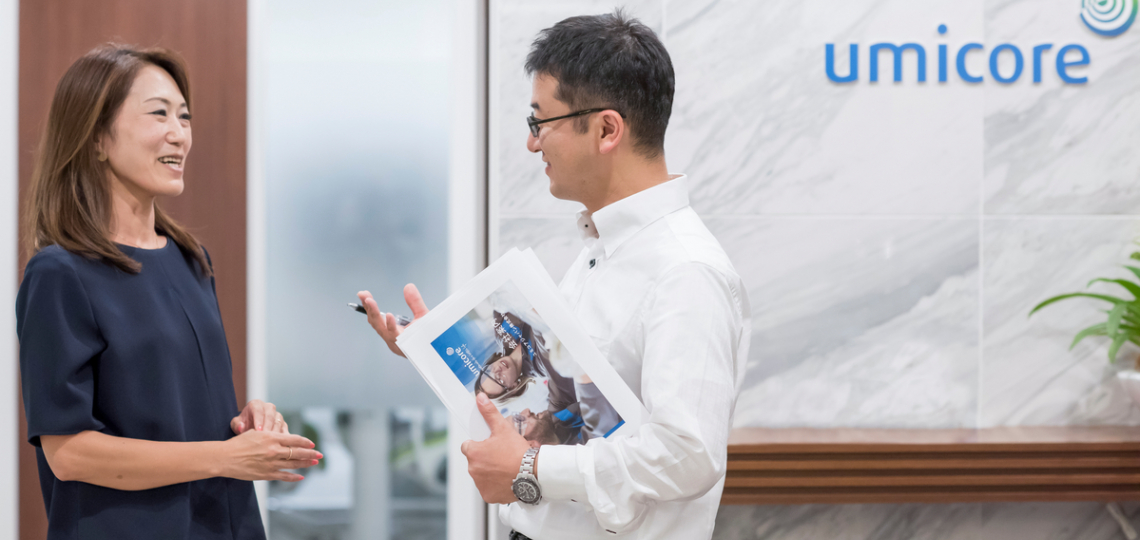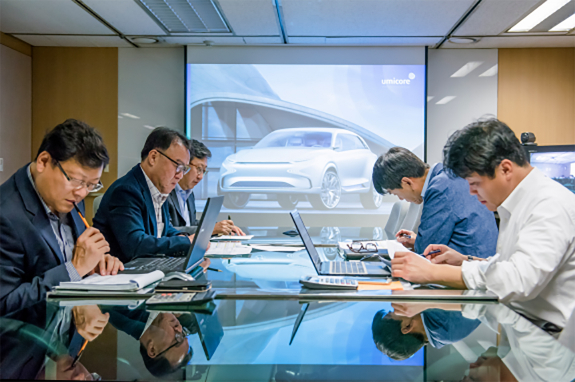
Financial Review
Non-recurring items
Non-recurring items had a negative impact of € 30 million on EBIT over the period. Restructuring charges accounted for € 26 million and were mainly related to the discontinuation of the activities at the Wickliffe site in the business unit Cobalt & Specialty Materials. Umicore’s definition of non-recurring items also includes impairments of permanently tied-up metal inventories. As previously mentioned, Umicore is applying as from 1 January 2019 the IAS 16 and IAS 36 principles to value our permanently tied-up metal inventories which implies that these inventories are part of our annual impairment testing of the businesses (cash generating units) that carry those inventories. The close of 31 December 2019 identified no need for impairments on the permanently tied-up metal inventories. The impact of non-recurring charges on the net result (Group share) amounted to € 24 million.
Hedging
Over the course of 2019, Umicore entered into additional forward contracts to secure a substantial portion of our structural price exposure for certain precious metals, providing increased earnings visibility. In particular for gold and palladium, Umicore locked in more than half of our 2020 and 2021 exposure. Umicore also hedged a significant portion of our platinum exposure for 2020. In the absence of a paper market, no forward contracts were entered into for rhodium.
Financial result and taxation
Net recurring financial charges totaled € 83 million, compared to € 69 million in 2018, mainly due to higher forex costs and net interest charges. The latter reflect higher financial debt, including an increased portion of local funding in Asia.
The recurring tax charge for the period amounted to € 103 million, which is in line with 2018 and corresponds to a recurring effective tax rate of 24.7% (24.4% in 2018). The total tax paid in cash over the period amounted to € 87 million, which is € 41 million lower than the same period last year. The Group applied the IFRIC 23 interpretation retrospectively with the cumulative effect of initially applying the Interpretation recognized as an adjustment to the opening balance of the reserves on 1 January 2019.
Cashflow
Cashflow generated from operations, including changes in net working capital, amounted to € 549 million compared to € 92 million in 2018. After deduction of € 588 million of capital expenditures and capitalized development expenses, this corresponds to a negative free cash flow from operations over the period of € 39 million, compared to a negative free cashflow of € 406 million last year.
Recurring EBITDA amounted to € 753 million, up 5% compared to € 720 million in the same period last year, and corresponds to a recurring EBITDA margin of 22.1 % compared to 21.9% in 2018. The adoption of the new IFRS 16 lease standard had a positive effect of € 17 million on recurring EBITDA over the year. Net working capital for the Group increased € 78 million compared to end of 2018. This reflects a pronounced increase in working capital needs in the Catalysis business group in the second half of 2019 due to higher PGM prices, partly offset by a release of working capital in the Recycling business group.
Capital expenditures totaled € 553 million, up from € 478 million in 2018 reflecting higher investments in all business groups. Energy & Surface Technologies accounted for close to two thirds of the amount, with investments primarily linked to the ongoing major greenfield expansion programs in cathode materials in China and Poland.
The higher investments in Catalysis reflect the capacity expansions in China, Poland and India as well as the expansion of fuel cell catalyst capacity in Korea. In Recycling, capital expenditures comprise the investments carried out during the extended maintenance shutdown of the Hoboken plant as well as the investments to further improve the environmental performance of the plant.
The acquisition of the cobalt refining and cathode precursor activities at Kokkola, Finland, was completed early December, resulting in a net cash out of € 188 million. Dividends paid to Umicore shareholders over the period amounted to € 186 million and the net cash outflow related to the purchase of treasury shares to cover stock options and share grants was € 29 million.
Financial debt
Net financial debt at 31 December 2019 stood at € 1,443 million, up from € 861 million at the end of 2018, largely driven by our capital expenditures and the Kokkola acquisition. The recognition of operating leases in financial debt following the application of the new IFRS 16 lease standard had an impact of € 46 million. Net financial debt at the end of the period corresponded to 1.9x recurring EBITDA. Group shareholders’ equity stood at € 2,593 million resulting in a net gearing ratio (net debt / net debt + equity) of 35.2%.
The net financial debt includes the € 390 million long term US private debt placement issued in June 2019, which was drawn upon in September 2019. It complements the existing long-term private debt placements which were issued in 2017 for a total amount of € 690 million, two undrawn Syndicated Bank Credit Facilities of a total amount of € 795 million and substantial additional shorter-term funding instruments.



